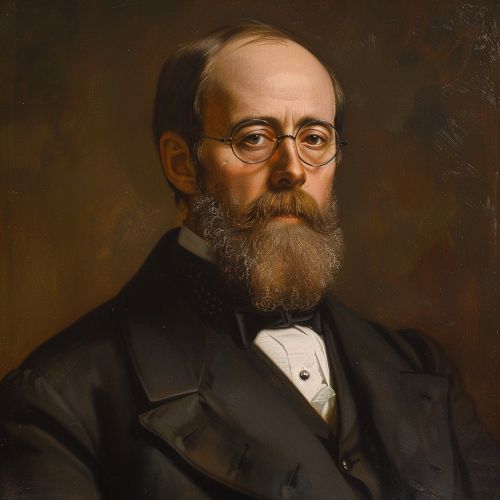Wilkie Collins
Early Life and Education
William Wilkie Collins was born on January 8, 1824, in Marylebone, London, to William Collins, a well-known painter, and Harriet Geddes. His early education was somewhat irregular, reflecting his family's frequent travels across Europe. Wilkie attended the Maida Hill Academy in London, where he showed an early interest in storytelling and literature. His father’s artistic influence and the family's cultural exposure during their travels played a significant role in shaping his literary inclinations.
Literary Career
Early Works
Collins's literary career began with the publication of his first novel, Antonina; or, The Fall of Rome in 1850. This historical novel set during the fall of the Roman Empire received moderate success and established him as a writer. His subsequent works, including Rambles Beyond Railways (1851), a travelogue about Cornwall, and Basil (1852), a novel exploring themes of obsession and revenge, further cemented his reputation.
Collaboration with Charles Dickens
A pivotal moment in Collins's career was his collaboration with Charles Dickens, whom he met in 1851. Their friendship and professional relationship significantly influenced Collins's writing style and success. Collins contributed to Dickens's periodicals, Household Words and All the Year Round, and co-wrote several plays with him, including The Frozen Deep (1856). This collaboration also led to the serialization of some of Collins's most famous works.


Major Works
The Woman in White
The Woman in White (1859) is perhaps Collins's most famous work and a pioneering example of the sensation novel genre. Serialized in All the Year Round, it captivated readers with its intricate plot, mysterious characters, and themes of identity and madness. The novel's success was unprecedented, leading to adaptations in various forms, including stage plays and films.
No Name
Published in 1862, No Name explores themes of social identity and illegitimacy. The novel follows the story of Magdalen Vanstone, who, after discovering her illegitimate status, embarks on a quest to reclaim her inheritance. No Name is notable for its complex narrative structure and psychological depth, characteristics that became hallmarks of Collins's writing.
Armadale
Armadale (1866) is another significant work in Collins's oeuvre. This novel delves into themes of fate, identity, and moral ambiguity. The story revolves around the lives of two men named Allan Armadale and their intertwined destinies. Armadale is distinguished by its elaborate plotting and the character of Lydia Gwilt, one of Collins's most memorable and morally complex creations.
The Moonstone
The Moonstone (1868) is widely regarded as the first modern detective novel. The story centers on the theft of a precious diamond and the subsequent investigation to recover it. The Moonstone introduced many conventions of the detective genre, including the use of multiple narrators, red herrings, and the detective figure, Sergeant Cuff. The novel's influence on subsequent detective fiction is profound and enduring.
Later Life and Works
Health and Personal Struggles
Collins's later life was marked by chronic health issues, particularly severe rheumatic gout. His dependence on opium for pain relief influenced both his personal life and his writing. Despite these challenges, he continued to produce significant works, including Man and Wife (1870), Poor Miss Finch (1872), and The Law and the Lady (1875).
Final Years
In his final years, Collins's output slowed, but he remained a respected literary figure. His last major novel, Blind Love, was left unfinished at his death on September 23, 1889, and was completed by his friend, Walter Besant. Collins was buried in Kensal Green Cemetery in London.
Literary Style and Themes
Collins's writing is characterized by its intricate plotting, psychological depth, and exploration of social issues. He frequently addressed themes such as identity, madness, and the law, often challenging contemporary social norms and conventions. His use of multiple narrators and complex narrative structures was innovative and influential, particularly in the development of the detective and sensation novel genres.
Legacy
Wilkie Collins's contributions to literature, particularly in the genres of sensation and detective fiction, have left an indelible mark. His works continue to be studied and adapted, reflecting their enduring appeal and significance. Collins's innovative narrative techniques and exploration of psychological and social themes have influenced countless writers and remain relevant in contemporary literary studies.
